De Russische dichter, schrijver, filosoof en theoloog Alexej Stepanovitsj Chomjakov werd geboren op 1 mei 1804 in Moskou. Zie ook alle tags voor Alexej Chomjakov op dit blog en ook mijn blog van 1 mei 2010.
Russian Song
Hail, lovely land of Saint Vladimir!
Thy strength is vast, thy cities mighty;
Thou hast a host of faithful people!
On azure mountains firm thou leanest;
In azure seas thy feet thou bathest.
Thou dost not fear the cruel foe,
But thou dost fear the wrath of God!
Hail, lovely land of Saint Vladimir!
My fathers’ fathers gave thee service.
They won thee peace by fruitful reason,
Thy holy cities they embellisht,
Thy cruel foes they helpt to vanquish.
Recall the good deeds of my fathers.
They served thee with a faithful service,
And I with faithful heart have served thee.
On the steppes from my loins have peasants descended,
Have peasants descended, well-to-do little peasants;
Their place do they know, they know what is useful,
Their brethren they love, and God do they worship.
From me, in the courts, has justice been done
Has justice been done, unbought and impartial.
From me has gone forth to the whole world a rumor
That bluer skies are not to be seen,
That bluer seas are not to be plowed,
That beautiful is the land of Vladimir.
Admire her—thou wilt never sufficiently gaze;
Draw wisdom from her, thou ne’er wilt exhaust her.
Across the heavens the bright sun goes;
All the earth it warms, it lightens.
By night the crowded stars are shining,
And there is no counting the sand or the grass-blades,
And over the earth proceed the words of God—
It warms with life, with joy it shineth;
Bright gleam the churches’ golden cupolas,
And the servants of the Lord and the pilgrims
Are countless like the grass-blades on the steppes,
Are countless like the sands upon the sea-shore.
Vertaald door Nathan Haskell Dole
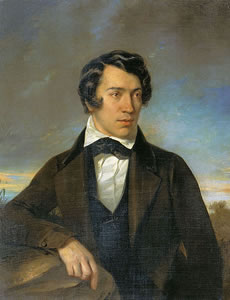
Alexej Chomjakov (1 mei 1804 – 5 oktober 1860)
Zelfportret, 1842
De Franse schrijver Marcel Prévost (eig Eugène Marcel) werd geboren op 1 mei 1862 in Parijs. Zie ook alle tags voorMarcel Prévost op dit blog en ook mijn blog van 1 mei 2010.
Uit: Les Don Juanes
« Quand, aux quatre coins du monde, sur tous ces peuples que la guerre avait bouleversée, ruines, affamés, décimés, l‘acier des canons et le bronze des cloches lancèrent en ondes sonores la nouvelle de Parmistioe, prélude certain de la paix, le monde connut” un instant de stupeur.
Courbés durant cinquante-deux mois sous le destin, les peuples, a la longue, s‘étaient faits à leur servitude; a demi hallucinæ, à demi anesthüi6s, ils oheminsient dans le noir, ne demandant même pas où ils allaient, ni combien de temp: durerait encore un voyage dont les périls et les douleurs ne comptaient plus. On vivait, on mourait; un jour était supportable, un autre horrible : fallait-il s’en inquiéter par avance ou s‘en souveni; après, puisque l’on ne pouvait rien changer a rien.
Cependant, quelques gestes de joie s’ébauchaient çà et là, parce que l‘humaine volonté de jouir et de vivre est plus forte que tout; mais ces gestes cherchaient le rnystère, ou léxcuse de distraire ceux qui allaient mourir… Un plaisir qui ne se masquait pas «l‘hypocrisie était réputé criminel, et la saveur en devenait à la fois plus ambre et plus voluptueuse.
Délié de toutes les règles sociales ordinaires, mêlant les races, les castes et les âges dans une farandole macabre et sadique, l’amour se déguisait en pitié.
Proche du front, il restait du sang aux mains chaude: de caresses, et le goût de l‘iodoiforme empoisonnait les baisers; a l’arrière, ceux qui joignaient leurs lèvres n’osaient souvent pas unir leurs regards, tant certaines trahisons leur semblaient aggravée: de sacrilège.”
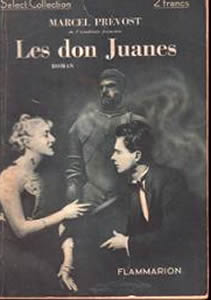
Marcel Prévost (1 mei 1862 – 8 april 1941)
Cover
De Duitse dichter Konrad Weiß werd op 1 mei 1889 geboren in Rauhenbretzingen. Zie ook alle tags voor Konrad Weiß op dit blogen ook mijn blog van 1 mei 2010
Nachtstille 1
Auf meinem Lager nachtumhängt
hinwachend ruhelos bedrängt,
ob eine Lichtung Ziel mir weist,
gräbt um sich fort mein armer Geist.
Und in sich redend stumm in stumm,
gräbt er die Lebensschollen um,
es wirft den dumpfen Körper schwer
des Gräbers Werkzeug hin und her.
Vom Fenster ein getrübtes Licht,
als sei mir hier Behausung nicht,
sei eine Grube erdenkühl,
reicht nicht zu meinem dunklen Pfühl.
Und schleppt mir doch mein heißer Sinn
mein Inbild wie zum Amboß hin
und hämmert mit gezieltem Schlag,
als sei ein lichtgewordner Tag.
Schlag immer zu, ich liege still
und harre, was geschehen will,
es krümmt sich, bildet sich, geschieht,
je mehr mein Herz entgegenglüht.
Zum Tage
Der ich mein Haupt rücklings verkehre
zum Morgenlicht,
verzweigend meiner Glieder stillen Bann,
vergaß ich, daß ich nicht,
der ich zum Tag mich ganz erheben kann,
entlastet bin, ein laubentladner Baum?
Nun steh ich wie in Knospenschwere:
ich rang die ganze Nacht mit dir im Traum.
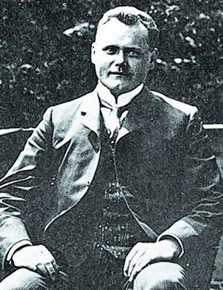
Konrad Weiß (1 mei 1880 – 4 januari 1940)
De Britse dichter, schrijver en politicus Joseph Addison werd geboren in Milston (Wiltshire) op 1 mei 1672. Zie ook alle tags voor Joseph Addison op dit blog en ook mijn blog van 1 mei 2010.
Ode
The spacious firmament on high,
With all the blue ethereal sky,
And spangled heav’ns, a shining frame,
Their great original proclaim:
Th’ unwearied Sun, from day to day,
Does his Creator’s power display,
And publishes to every land
The work of an Almighty Hand.
Soon as the evening shades prevail,
The Moon takes up the wondrous tale,
And nightly to the list’ning Earth
Repeats the story of her birth:
Whilst all the stars that round her burn,
And all the planets, in their turn,
Confirm the tidings as they roll,
And spread the truth from pole to pole.
What though, in solemn silence, all
Move round the dark terrestrial ball?
What though nor real voice nor sound
Amid their radiant orbs be found?
In Reason’s ear they all rejoice,
And utter forth a glorious voice,
For ever singing, as they shine,
‘The Hand that made us is Divine.’
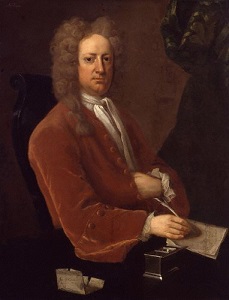
Joseph Addison (1 mei 1672 – 17 juni 1719)
Portret door Michael Dahl, 1719
De Braziliaanse schrijver José Martiniano de Alencar werd geboren op 1 mei 1829 in Mecejana. Zie ook alle tags voor José Martiniano de Alencar op dit blog en ook mijn blog van 1 mei 2010.
Uit: Senhora, Profile of a Woman (Vertaald door Catarina Feldmann Edinger)
“One evening, at the casino, Lísia Soares, who was very close to her and would have liked to see her married, made a comment about Alfredo Moreira, an elegant young man who had just arrived from Europe.
“A very distinguished gentleman,” replied Aurélia, smiling. “He is worth about a hundred thousand as a fiance, but I can afford a more expensive husband, Lísia; this one is not good enough for me.”
Everyone laughed at these remarks of Aurélia’s and considered them jests of a witty young girl. The majority of ladies, however, especially those with young daughters, were unrelenting in their criticism of this brazen conduct as improper for a well-bred young lady.
Aurélia’s suitors knew of the value placed upon them in the girl’s ledgers, for she made no secret of it. Rather than being upset at her honesty, however, they enjoyed the game—which often resulted in an increase in their stock in the nuptial business.
This happened whenever one of these young men was fortunate enough to do something that pleased the girl and fulfilled her fantasies. In such case, she raised his price, just as she similarly lowered that of those who displeased her or fell into disfavor with her.
Greed must have inured these men, or passion blinded them, for them not to see the cold scorn with which Aurélia deceived them in these silly games they took as girlish vanity, but which were, in fact, the impulses of a hidden, perhaps morbid, anger.
The truth is that they all persisted; at times caught up in temporary despair, but soon restored by an obstinate hope, none chose to abandon the field; least of all, Alfredo Moreira, who appeared to head the list.
I shall not follow Aurélia in her transient passage through the salons of the court, where she saw, coupled to her triumphant chariot, everything our society boasts of the most elevated and brilliant.
All I propose is to tell of the intimate and strange drama that decided the fate of this unique woman.”
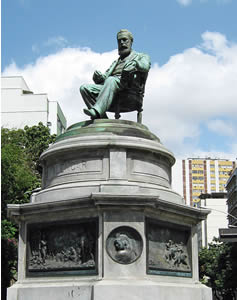
José Alencar (1 mei 1829 – 12 december 1877)
Monument in Rio de Janeiro
De Franse kroniekschrijver en biograaf Jean de Joinville werd geboren rond 1 mei 1224 als zoon van Simon van Joinville en van Beatrix van Auxonne. Zie ook alle tags voor Jean de Joinville op dit blog en ook mijn blog van 1 mei 2010.
Uit: Livre des saintes paroles et des bons faiz nostre roy saint Looys
« Il disoît que Ten devoit son cors vestir et amer en tele ma-nîère, que les preudeshomes ‘ de ce^ siècle ne deissent que II en feist trop , ne que les joenes * homes ne dissent que II feist pou ‘. Et ceste chose me ramentî < le père le roy * qui orendroit^ est, pour les cotes brodéez à armer ^ que en fait hui et le jour, et li dîâoie que onques en la voie d’outremer là où je fîiz, je ni Vî cottes brodées, ne les roy ne les autrui. Et il ine dit qu’il avott tiex” atours brodez de ses armes, qnili avoient cousté huit cens livres de parisis. Et je H diz que il les eustmîex emploies se il les eust donnez pour Dieu, et eustfait ses atours de bon cendal enforcié de ses armes, si comme son père faisoit.
Il m’apela une foiz et me dist : « Je n’ose parler à vous pour le soutil senz dont vous estes de chose qui touche à teu; et pour ce aî-je appelé ses frères qui ci sont, que je vous weît faire une demande. » La demande fu tele : « Séneschal, fist- il, quel chose est Dieu? » Et je li diz : « Sire, ce est si benne chose que meilleur ne peut estre. » — « Vraiement, ûsxai, c’est bien respondu ; que ceste response que vous avez faîte , est escripte en cest livre que je tieing en ma main. Or vous demandé-je, flst-il , lequel vous ameriés roiex , ou que vous feus^ siés mesiaus*’, ou que vous eussiés fait un péchié mortel.”
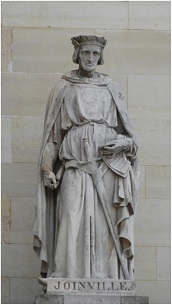
Jean de Joinville (ca. 1 mei 1224 – 24 december 1317)
Standbeeld in Parijs
